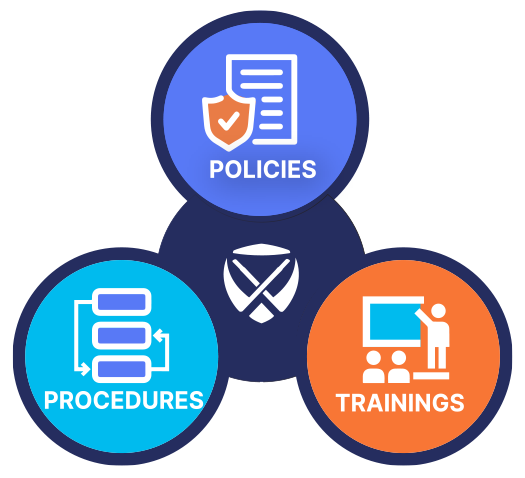At Jemurai, we understand that the thought of cyber attacks can be overwhelming and concerning. For over a decade, we’ve helped clients with Application SecurityApplication security is the protection of software applications from cyber threats and vulnerabilities. Policies are established to guide the development and deployment of applications in a secure manner. Procedures are created to detail the steps necessary to secure applications and to ensure that policies are consistently followed. Training is provided to developers and other personnel to ensure that they understand the policies and procedures and are able to apply them effectively. By implementing policies, procedures, and training in SPIO, organizations can reduce the risk of cyber attacks on their applications and protect sensitive data from theft or damage., Penetration TestingPenetration testing, also known as pen testing, is a security assessment method that simulates a real-world attack to identify vulnerabilities in a system, application, or network. Penetration tests are conducted by ethical hackers who attempt to exploit weaknesses in a system's security defenses using a variety of tools and techniques. The goal of a penetration test is to identify vulnerabilities and provide recommendations for remediation before they can be exploited by malicious actors., and other aspects of cybersecurity consulting. In that time, we created a tool called securityprogram.io (SPIO) where clients can manage their security program in a straightforward framework which is easy to understand. You can feel confident about the overall strength and effectiveness of your organization's security measures and the degree of protection it has against cyber threats by starting a strong security program today.
A security program is a documented collection of information security policies, procedures, and related training that an organization puts in place in order to protect critical business systems, networks, and data. A security program can take time to build, which means that many smaller or newer companies might not have one, which could leave them vulnerable to attacks and breaches. When building a security program, it is imperative that it has strong policies, procedures, and training components.
Security policies clearly outline an organization’s approach, rules, and expectations about how to preserve the confidentiality, integrity, and availability of its data while regulating access to systems and information. Many US organizations build their security policies to align with the NIST 800-53 cybersecurity standard and compliance framework developed by the National Institute of Standards in Technology. This continuously updated framework strives to define standards, controls, and assessments based on risk, cost-effectiveness, and capabilities, and many of the industry specific compliance certifications (such as HITRUST, SOC-2SOC 2 is a type of Service Organization Control (SOC) report that evaluates the effectiveness of an organization's controls related to security, availability, processing integrity, confidentiality, and privacy. These reports are based on the Trust Services Criteria (TSC) developed by the AICPA and are commonly used by technology and cloud service providers to demonstrate compliance with industry standards and best practices., FedRAMP) align with NIST 800-53NIST 800-53 is a special publication by the National Institute of Standards and Technology (NIST) that provides a catalog of security and privacy controls for federal information systems and organizations. The publication outlines security requirements and guidelines for the selection, implementation, and assessment of security controls to protect the confidentiality, integrity, and availability of information systems. standards.
Procedures outline a series of tasks that need to be performed to ensure adherence to and compliance with a cybersecurity policy. Security procedures are designed to preserve the confidentiality, integrity, and availability of its data while regulating access to systems and information. Security procedures, and related tasks, will be assigned to many members of an organization. IT Staff will have robust procedures addressing most areas of security, including managing access to systems, networks, and data. Users will also have to adhere to procedures about passwords, laptop timeouts, and clean desk policies,
Security training ensures that your staff knows about your IT policies and procedures and is able to adhere to them and implement them. IT staff in particular should go through comprehensive training around security awareness in order to prevent and mitigate attacks on your systems, servers, applications, and data. Such training is designed to help IT staff understand the vital role they play in helping to prevent breaches and combat attacks.
Security tasks are the things which need to be done in order to adhere to security program requirements. They include high-level strategic planning, to day-to-day boundary policing of systems, to the integral work of application security defenses built into program architecture. Every single member of your IT team is in some way responsible for performing tasks that will strengthen the security of your systems.
securityprogram.io (SPIO) facilitates implementation of a security program that complies with the most common standards through its easy-to-use and editable policies, procedures, and training templates. All of SPIO’s policies adhere to NISTNIST stands for the National Institute of Standards and Technology, which is a US government agency responsible for developing and publishing standards and guidelines related to information security and cybersecurity. 800-53 standards but the tasks are also cross-referenced to other standards to make sure you get credit for the work you do. SPIO covers all parts of your business by organizing them into the following rounds of cybersecurity:
By starting a security program, you can feel confident in your organization's ability to protect against cyber threats and safeguard your digital assets. Jemurai created SPIO to simplify security activities with powerful automated tools so you can focus on your business. Rather than feeling overwhelmed by the complexity of cybersecurity, SPIO can provide a clear roadmap for improving your security posture and staying ahead of potential risks.


SPIO helps SMBs implement comprehensive cybersecurity. Start a free trial today to track the policies, procedures, and tasks needed to be confident in your security posture.